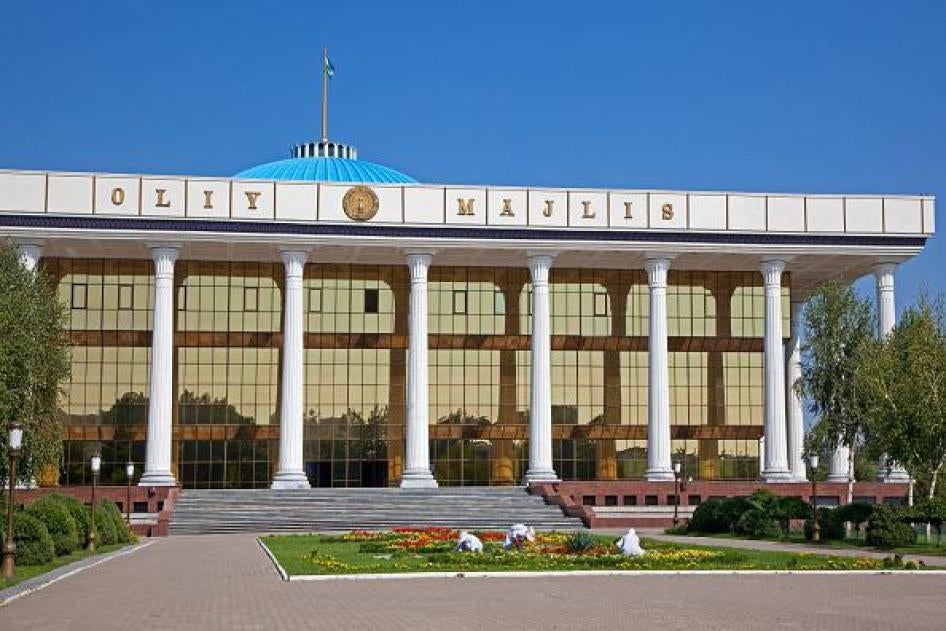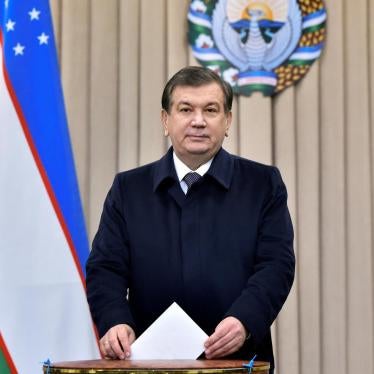On December 22, 2019, Uzbekistan will hold its first parliamentary elections since President Shavkat Mirziyoyev came to power in September 2016, following the death of former President Islam Karimov.
President Mirziyoyev has taken some steps for reform, including to improve the country’s human rights record. The government presents the parliamentary elections as an important part of this reform process.
Nevertheless, Uzbekistan’s political system remains largely authoritarian. There is little political pluralism, and the conduct of the country’s elections has for many years been highly restricted. President Mirziyoev’s election in December 2016 took place under severe restrictions that denied voters their basic rights and prevented the elections from being free or fair.
Uzbekistan adopted some changes to its election code in February, but the Organization for Security and Co-operation in Europe’s Office for Democratic Institutions and Human Rights (OSCE ODIHR), the most important election monitoring organization in the region, has stated that the parliamentary election will not allow voters a genuine choice of candidates.
This questions and answers document provides a briefing on key issues around the parliamentary elections and on important human rights issues in Uzbekistan today.
Uzbekistan’s elections on December 22 are taking place under the slogan ‘New Uzbekistan – New Elections’. What are independent election monitors saying about it?
ODIHR is monitoring the election with a team of 265 observers, including 11 election experts, 30 long-term observers, and 224 short-term observers from OSCE participating states. The organization has acknowledged the importance of some of the changes to the election code, under which five laws were combined into one unified legal act.
The changes include removing a provision for seats in parliament reserved for the Ecological Party of Uzbekistan and removal of restrictions on voter rights based on criminal proceedings or convictions. Voters are also able to add their names to more than one of the signature lists that political parties are required to compile in order to register to run in the elections.
However ODIHR also made it clear that Uzbekistan has failed to address its longstanding concerns with elections in the country. No opposition parties have been allowed to compete for many years, and the authorities have heavily restricted media reporting during past elections. No new political party has been registered in the country since 2003.
In a July report following a preparatory trip to Uzbekistan, ODIHR noted that “the (new) election code does not address a number of long-standing (ODIHR) recommendations, many of which pertain to restrictions on or an absence of guarantees of fundamental freedoms,” such as limitations on freedom of assembly, expression, and association.
In a December 13, 2019 interim report on the parliamentary election, ODIHR notes that “The legislation on the registration of political parties – which ODIHR has assessed as burdensome and open to arbitrary application – remains largely unchanged”.
Following its monitoring of the December 2016 presidential election in Uzbekistan, ODIHR concluded that “the dominant position of state actors and limits on fundamental freedoms undermine political pluralism and led to a campaign devoid of genuine competition.” The organization recommended “comprehensive reforms” of the election code and of laws restricting basic human rights.
A Tashkent-based human rights group, Ezgulik, earlier this year publicly appealed to President Mirziyoyev to relax the requirements to register a political party. The group stressed that the government’s own key development document, its Strategy of Action on the Five Priority Directions of Development of the Republic of Uzbekistan in 2017-2021, “emphasizes the development of (a) political system, strengthening the role of political parties in the life of the state and society, creating a healthy competitive environment.”
But as Ezgulik noted, the Justice Ministry’s requirement for signatures from 20,000 people to register a party is “incompatible with these goals.” It called for a significant reduction in the number of signatures required.
“This is not an election, it is just some kind of political process,” Abdurahmon Tashanov, the Ezgulik leader, said in a separate interview, referring to the elections this month.
Who is running in the election?
There are 150 seats up for election in the parliamentary election. There are also regional and local elections taking place on the same day.
Five registered political parties have been allowed to run candidates in the parliamentary elections, but all operate within the political confines defined by the president and his government. No opposition parties or independent candidates are able to run for office.
The five parties are the Liberal Democratic Party, the People’s Democratic Party, the Social Democratic Party “Adolat,” the Democratic Party “Milliy Tiklanish” and the Ecological Party of Uzbekistan which is participating for the first time.
Some parties included general references to human rights issues in their party platforms, on topics such as judicial independence, the role of civil society, and disability rights.
A larger number of women are running for office this year than in previous elections. The new election code requires that at least 30 percent of the parliamentary candidates for any party must be women. Out of 750 candidates, 310 are women, representing 41 percent of candidates.
Uzbek government officials also noted that many of the registered parties are fielding new, younger candidates compared with previous elections and expressed the hope that the new parliament will be more dynamic and independent of the executive than previous ones.
According to ODIHR, by mid-December there had been 36 live or pre-recorded televised election debates among party representatives. ODIHR noted that, “Frequent debates are taking place but journalists in traditional media have generally not sought to scrutinize party programs. Increasingly bloggers are seen as the most important source of independent commentary”.
ODIHR also noted that for the first time local election observers will be allowed to officially observe the polls. However, these “citizen observers” are restricted to committee members of a Mahalla, traditional Uzbek community structures. This limit means “any other civil society organizations” are excluded from election observation.
Has there been progress on human rights in Uzbekistan in recent years?
There have been some signs of hope on human rights under President Mirziyoyev, with improvements in the country’s abysmal record after the 27-year legacy of abuse under Karimov, his predecessor. Since 2016, the government has released from prison more than 50 people detained on politically motivated charges. They include human rights defenders, journalists, and other activists, some of whom had been jailed for many years. Some had suffered torture or mistreatment.
In August 2017, the government issued a decree to ban the forced mobilization of public sector workers into the cotton fields and the government has taken concrete steps to carry out the ban.
There has been an increase in media activity, within clear boundaries set by the government. Restrictions on the internet have been eased and social and economic issues are widely discussed on social media. At least 11 websites, including Eurasianet, Fergana News, Human Rights Watch and the BBC’s Uzbek service, were unblocked in May. Access to YouTube and Facebook, blocked for periods in August-November 2018, was restored in December 2018. In the past two years, correspondents of Eurasianet, Voice of America and BBC have received accreditation.
Nongovernmental organizations are no longer required to keep their funds in only two state-approved banks, and the Justice Ministry announced new regulations to ease registration procedures for independent groups and relax control over their activities in 2018 and 2019. In March 2018, President Mirziyoyev reduced the powers of the repressive National Security Service (SNB). A range of its responsibilities was transferred to the Interior and Defense Ministries.
What are the continuing concerns on human rights?
Despite these ongoing reforms, Uzbekistan retains many key elements of an authoritarian state. The SNB still holds strong powers. Thousands of people are in prison on politically motivated charges, including many peaceful religious believers. Many former detainees jailed on politically motivated charges have not been legally rehabilitated and have not received adequate medical treatment. The use of torture and ill-treatment by law enforcement authorities remains widespread, as noted earlier in December by the United Nations Committee against Torture.
Media censorship is widespread and media outlets have to operate within clear boundaries. Journalists face harassment and sometimes detention. The Uzbek service of Radio Free Europe/Radio Liberty, Ozodlik, remains blocked.
Following a visit to Uzbekistan in September, the UN special rapporteur on the independence of judges and lawyers concluded that “substantial threats against judicial independence and the rule of law remain,” including the broad powers that prosecutors have in criminal proceedings, which limits judges’ independence.
Nongovernmental groups working on civil and political rights, including electoral rights have not been able to register with the authorities. ODIHR notes that it is not aware of any such registered organization. Three attempts by a group of former political prisoners and human rights defenders , Azam Farmonov, Agzam Turgunov, and Dilmurod Saidov, to register with the Justice Ministry a new group called Restoration of Justice have been unsuccessful.
Human Rights Watch remains unable to register in Uzbekistan due to a 2011 Supreme Court decision which allowed the Justice Ministry to liquidate the organization’s office registration in Tashkent. The organization was unable to work in the country between 2010 and 2017 but has been able to visit and conduct research in the country since September 2017.
What other human rights issues remain of concern in the country?
Consensual sexual relations between men are a criminal offense under Uzbek law, punishable by a prison sentence of one to three years. Uzbekistan and Turkmenistan are the only two post-Soviet states that have not decriminalized adult consensual same-sex conduct.
In 2019, the government hastily demolished thousands of homes across Uzbekistan as a part of urban renewal and beautification projects. Evicted homeowners often had no prior notification or adequate compensation.
Despite the ban on sending public service workers into the cotton fields, tens of thousands of people are still forced to go to the fields every autumn to pick cotton, often facing difficult or hazardous working conditions in the process. An estimated 170,000 people were forced to pick cotton in the 2018 harvest.









